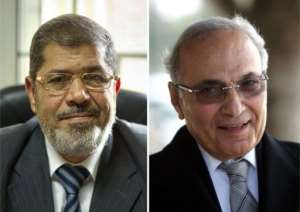
CAIRO (AFP) - Egypt looks set for a run-off presidential vote between the Muslim Brotherhood's Mohammed Mursi and Mubarak-era minister Ahmed Shafiq, pitting Islamists who helped oust the dictator against his last premier.
The official MENA news agency reported partial results showing Mursi leading with 1.82 million votes, followed by Shafiq with 1.78 million votes and a surprise showing by pan-Arab leftist Hamdeen Sabahi with 1.64 million.
A run-off between Shafiq and Mursi will further polarise a nation that rose up against president Hosni Mubarak's authoritarianism 15 months ago but has since suffered a spike in violence and a declining economy.
The Muslim Brotherhood also announced that, with 90 percent of votes tallied from the Wednesday-Thursday election but with no single candidate clearing the required 50-percent mark, its candidate was leading.
"There will be a run-off between Mohammed Mursi and Ahmed Shafiq," after 90 percent of the votes were counted nationwide, the Islamist group said on its website.
Representatives of the 12 candidates contesting the election witnessed the overnight vote count across the country and were present when the individual results were announced at each polling station.
Judges overseeing the count then handed the official results of each station to the candidates' representatives. The Islamist group compiled the results from around the country and then announced them.
A spokesman from Shafiq's campaign, Karim Salem, said they were "confident that General Shafiq would be in the second round" but they were still waiting for official results.
"It's the candidate who was the clearest and the most honest," Salem told AFP, denying fears that Shafiq would represent a retreat from the goals of the uprising.
"No (the Mubarak) era is finished, politics have changed. Egypt is entering democracy," Salem said.
The top two vote-getters will face each other in a run-off on June 16-17.
Between now and then, there is likely to be intense horse-trading between the two frontrunners to win over supporters of the losing candidates, some of whom share similar beliefs.
In Cairo, voters were thrilled by the free, contested election, whose results were not predetermined, but conceded that many challenges lay ahead.
"It's our first year of democracy, like a baby that is still learning to crawl," said Mustafa Abdo, a bank employee.
The election saw 50 million eligible voters given the chance to choose among 12 candidates pitting Islamists who pledged to uphold the uprising's ideals against former regime figures who touted their experience.
US Secretary of State Hillary Clinton congratulated Egypt on its "historic" presidential election, and said Washington was ready to work with a new government in Cairo.
Electoral commission officials said turnout was around 50 percent over the two days of voting.
Contenders included former foreign minister and Arab League chief Amr Mussa, who touted his experience but was hammered for his ties to the old regime.
Shafiq was also shunned by some for his time in Mubarak's government, but others praised his law-and-order platform in a country where many crave stability.
The powerful Muslim Brotherhood's candidate, Mursi, faced competition from Abdel Moneim Abul Fotouh, a former member of the Islamist movement who portrayed himself as a consensus choice.
During his campaign, Mursi offered a fiery stump speech, pledging a presidency that would be based on Islam but would not be a theocracy.
The election seals a tumultuous military-led transition from autocratic rule marked by political upheaval and bloodshed, but which also witnessed parliamentary elections that saw Islamist groups score a crushing victory.
The Supreme Council of the Armed Forces, in power since Mubarak's ouster, has vowed to restore civilian rule by the end of June, after a president is elected, but many fear its withdrawal from politics will be just an illusion.
The army, with its vast and opaque economic power, wants to keep its budget a secret by remaining exempt from parliamentary scrutiny, maintain control of military-related legislation and secure immunity from prosecution.
Mubarak, 84 and ailing, is being held in a military hospital on the outskirts of Cairo where he awaits the verdict of his murder trial on June 2.
The former strongman, ousted in a popular uprising last year, is accused of involvement in the killing of some 850 protesters during the uprising and of corruption.




 We’ll protect state wealth from opaque deals – Prof Jane Naana
We’ll protect state wealth from opaque deals – Prof Jane Naana
 Mauritania president says running for second term in June polls
Mauritania president says running for second term in June polls
 I won't ever say I was a mere driver’s mate' — Prof. Opoku-Agyemang
I won't ever say I was a mere driver’s mate' — Prof. Opoku-Agyemang
 2024 polls: 'EC struggling to defend credibility'— Prof. Opoku-Agyemang
2024 polls: 'EC struggling to defend credibility'— Prof. Opoku-Agyemang
 Akufo-Addo gov't's 'greed, unbridled arrogance, unrestrained impunity, sheer dis...
Akufo-Addo gov't's 'greed, unbridled arrogance, unrestrained impunity, sheer dis...
 Election 2024: Ghana needs an urgent reset, a leadership that is inspiring – Ma...
Election 2024: Ghana needs an urgent reset, a leadership that is inspiring – Ma...
 Partner NDC to rollout a future of limitless prospects – Prof Jane Naana Opoku-A...
Partner NDC to rollout a future of limitless prospects – Prof Jane Naana Opoku-A...
 NPP will remain in gov’t till Jesus comes — Diana Asamoah
NPP will remain in gov’t till Jesus comes — Diana Asamoah
 Sunyani Technical University demands apology from former SRC president over sex-...
Sunyani Technical University demands apology from former SRC president over sex-...
 'Dumsor' was resolved by Mahama but ‘incompetent' Akufo-Addo has destroyed the g...
'Dumsor' was resolved by Mahama but ‘incompetent' Akufo-Addo has destroyed the g...
